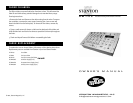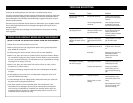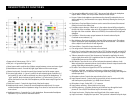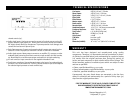
PLEASE READ CAREFULLY BEFORE USE OF THIS PRODUCT
FA I LU R E TO FO L LOW T H E I N ST RU C TI O NS P R I N TE D B E LOW M AY VO I D WA R R A N T Y
• Follow all security advice printed on your mixer
• When removing the unit's AC plug from the power source, grasp and pull the
plug, NEVER the cord itself!
• Avoid placing your mixer near heat sources, such as power amplifiers.
• When in use, place your mixer on a stable surface, away from vibration. Always
use care when carrying your mixer. Impact, or heavy vibration may compromise
the unit's mechanical integrity. The manufacturer is not responsible for damage
resulting from an impact, or misuse.
• When in use, place your mixer away from sources of hum or noise, such as
transformers, or electric motors.
• To prevent overheating, always provide your mixer with adequate ventilation
air space.
• Avoid stepping on your mixer's AC cord. Repeated compression of the cord
may lead to electrical shorting.
• To avoid damage due to AC voltage peaks, always disconnect your mixer from
the power source during electrical storms.
• Your mixer contains no user-serviceable parts. The manufacturer is not
responsible for any damage or personal injury resulting from unauthorized
user-servicing or modifications. In addition, the warranty will be void if any
unauthorized service by the user is detected. Always return you mixer to an
authorized Stanton dealer for servicing.
Thank you for making Stanton your first choice in professional DJ mixers.
This new, innovative family of mixers has been developed with input from the profes-
sional DJ community, bringing to the marketplace a previously unavailable, afford-
able combination of user-friendly, functional design, rugged construction, and pro-
fessional quality features.
Stanton and your authorized Stanton dealer are dedicated to your complete satisfac-
tion by offering benchmark service and support throughout the long life of your
Stanton product.
Again, we appreciate your patronage, and look forward to many years of making
music together.
Problem
Excessive hum when using
phono source.
Low frequency hum while
operating source unit.
Cause
Poor ground connection.
Loose cartridge/headshell
connection.
Poor AC source ground.
Loose input/output connec-
tion. Shorted cable.
Solution
Properly connect turntable
ground wire to mixer ground
terminal.
Check cartridge connection
to headshell. Check head-
shell connection to tonearm.
Properly ground the AC
source. Check all input and
output connections for
s e c u re fit. Isolate and re p l a c e
the damaged cable.
Pro g ram volume can’t be
adjusted with master vo l u m e
c o n t ro l .
No powe r.
Amplifier or outboard gear
connected to the re c o r d out-
put.
I m p roperly connected AC cord
or power line source not on.
B l own fuse.
Connect amplifier or outboard
gear to master output.
Properly connect AC cord to
AC power source. Turn powe r
o n .
Re m ove the fuse cover with a
flat-bladed scre wd r i ve r.
Replace fuse with a new
500mA fuse.
The amplifier is turned up,
but there is no signal.
No signal in headphones.
Faulty output connections
Improper level adjustment.
Improper connection.
Improper level or cue mix
settings.
Properly connect amplifier, or
outboard gear to mixer.
Properly set crossfader,
channel faders, gain con-
trols, and input selector tog-
gles.
Check headphone connec-
tion to mixer. Tighten if nec-
essary.
Adjust headphone level and
cue mix to the proper level
and channel settings.
T RO U B LE S H O OTI N G






